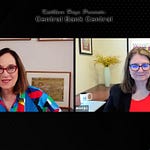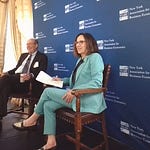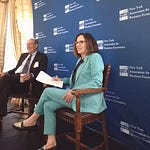Jacob Frenkel is an icon in the world of central banking and economics. He was two-term governor at the Bank of Israel, an esteemed economics professor and researcher at the University of Chicago , former chief economist at the International Monetary Fund, chairman of the Group of 30 for more than two decades and now its Chairman Emeritus, and during this same time period chairman of JPMorgan International.
Even with all of these achievements, Jacob’s eyes sparkle and his smile grows even wider as he tells people he holds a record at the Federal Reserve Bank of Kansas City’s annual Economic Symposium: this marks his 40th consecutive year attending the event, an achievement that illustrates how important he - and many others I might add - thinks this event is.
”This is the most fabulous place, it attracts people from all of the world,” he says. “And in particular, this is a unique conference organized by the Federal Reserve, the largest central bank in the world, and most important one for the international group of central bankers.”
”And I think this is the most important part of it: it is the informality, the ability of people to interact, to learn how the other guy thinks,” Jacob adds. “It’s jeans, it’s not a tie. And it creates camaraderie…which is helpful for the entire year and in times of crisis. There is nothing more important than direct communications among central banks.”
It is also the venue where, over the years, the Fed chair has used this highest of profile events to send an important message, a signal on where policy makers are heading next — as Powell did in his opening remarks on Friday when he said in “the time has come for policy to adjust.” This has been taken to mean the time has come for the Fed to cut rates, with the first one expected to at the FOMC’s September meeting.
”Jay Powell was extremely explicit,” Jacob says. The Fed chair “almost announced it.”
Jacob notes that the Fed chair threw in a note of caution. “Jay Powell was very careful, as he always is, saying, We need it, we will be data dependent, and we will need to see if we have some new information.”
”But other than surprises which can always come, we should assume the Fed is now on the road for easing,” he adds.
So what about bets among economists, investors, that the Fed will kick off its rate-cutting cycle with a 50 bps cut? As I put it in my question to Jacob , will the Fed move more cautiously than markets expect? Is it NOT getting ready “to go boom, boom, boom” with one or even two 50bps rate cut as some are forecasting?
”Boom, boom, boom should not be in the language of a central bank, “ Jacob respond. “Central banks should be step, step, step.”
”And you know the situation is so uncertain, and there is so much darkness and clouds that there is a dictum, you don’t run into a dark room,” he adds in his usual story teller way. “So…in order to eliminate the darkness you either have to walk very slowly or you have to turn on the light. And I think that is what the Fed has been doing.”
Jacob says — and this is very important - the Fed will go step by step and “will also turn on the light in the sense of being more explicit about communication to the markets.”
We covered a lot of important, interesting ground in this extensive interview:
- Is the 2% inflation target, invented and championed by John Taylor, coming and proponents of rules-based monetary policy coming under attack and should the Fed and others take another look at it’s usefulness in a changing world?
- Is the Fed behind the curve now? Is the Fed’s “data dependence” getting in the way of running a pre-emptive policy strategy?
- How will Fed rate cuts affect central banks in developing nations, emerging markets?
- On the other and of the spectrum, how is the central bank of a wealthy, developed, innovation and tech-driven like Israel dealing with the impact of the nearly year-long war with Hamas not only its economy and inflation, but on the entire Middle East region?
- Is central bank coming under attack and why is it so important for governments around the world to maintain it?
Take your time. Hear what Jacob has to say. The Fed appears to be embarking on its post-pandemic, post-peak-inflation phase. We can use as much guidance as we can get from a seasoned central banker like him as we can.













Share this post